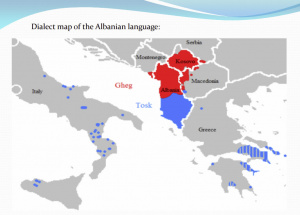Language/Tosk-albanian/Grammar/Future-Tense
Hi Tosk Albanian learners! 😊
In this lesson, we will learn about the future tense in Tosk Albanian. The future tense is used to describe actions or events that will happen in the future. It is an essential part of the Albanian language as it allows speakers to express their future plans and intentions. As always, we will be providing cultural information and interesting facts along the way!
With the completion of this lesson, consider investigating these related pages: Question Words & How to Use Have.
What is the Future Tense?[edit | edit source]
In Tosk Albanian, the future tense is formed by using the auxiliary verb "do" or "tha" followed by the infinitive form of the main verb. The choice of auxiliary verb depends on the emphasis on the intentions of the speaker or the evidence of the event.
For example:
| Tosk Albanian | Pronunciation | English translation |
|---|---|---|
| Unë do shkojë në shkollë | [u:nə dɔ ʃkɔj nə ʃkɔ:ɫə] | I will go to school |
| Të ata do ta vizitojnë Shqipërinë së shpejti | [tə ata dɔ ta vizitɔjnə ʃcipəɾinə sə ʃpɛjti] | They will visit Albania soon |
| Do të bëjme dush | [dɔ tə bəjmɛ duʃ] | We will take a shower |
Remember, these are only a few examples, but Tosk Albanian has several other ways of expressing future intentions that we will not be discussing in this lesson.
Irregular Auxiliaries[edit | edit source]
In Tosk Albanian, there are two irregular auxiliary verbs that are used to form the future tense, "do" and "tha."
"Tha" is commonly used in Southern Albania and has a slightly different meaning than "do." It is usually used when there is evidence of the event happening, such as when the speaker is certain that something will take place.
For example:
| Tosk Albanian | Pronunciation | English translation |
|---|---|---|
| Do ta shoh | [dɔ ta ʃɔ:] | I will see you (uncertain) |
| Tha ta shoh | [θa ta ʃɔ:] | I will see you (certain) |
"Tha" is also used to express willingness/obligation or past future events, while "do" is used to express the near future or to describe future plans.
For example:
| Tosk Albanian | Pronunciation | English translation |
|---|---|---|
| Do të takoj atë nesër | [dɔ tə takɔj a:tə nɛsəɾ] | I will meet him tomorrow |
| Thashë që do të bëj punën | [θaʃə cə dɔ tə bjɛj punən] | I said that I will do the job |
| Do të hap kafenë vërtet shpejt | [dɔ tə hap kafɛn fəɾtɛt ʃpjɛjt] | We will really open the coffee shop soon |
Dialogue[edit | edit source]
Here is a short dialogue to illustrate how to use the future tense in Tosk Albanian:
- Person 1: Do të bëjësh diçka të shtrenjtë për ditëlindjen time? ([Will you do something expensive for my birthday?])
- Person 2: Po, do të të bëj dhuratën më të mirë që mund të imagjinoj. ([Yes, I will give you the best gift I can imagine.])
Cultural Information[edit | edit source]
Albania is a beautiful country with a rich culture and history. In Albanian culture, it is common to express hospitality and generosity, and language plays a significant role in demonstrating these values. Albanians have an immense sense of pride about their language and use of it, and they believe that it is essential for anyone who wants to understand the Albanian culture to learn the language.
If you are interested in learning the Tosk Albanian language, you can find many online resources that can help you. As we mentioned in previous lessons, one great resource is the Polyglot Club website. If you really want to improve your language skills, we recommend that you connect with native speakers on the website. Find native speakers and ask them any questions you might have!
Summary[edit | edit source]
In this lesson, we have learned about the future tense in Tosk Albanian. We have seen that to form the future tense, we use auxiliary verbs such as "do" and "tha" followed by the infinitive form of the verb. We have also learned about the cultural importance of the Albanian language, and how learning it can be a gateway to understanding the rich history and culture of Albania. As always, we hope that this lesson has helped you improve your understanding of Tosk Albanian grammar. 😄
➡ If you have any questions, please ask them in the comments section below.
➡ Feel free to edit this wiki page if you think it can be improved. 😎
Sources[edit | edit source]
Other Lessons[edit | edit source]
- How to Use Be
- Adjectives
- Personal pronouns
- Give your Opinion
- Nouns
- How to Use Have
- Pronouns
- Conditional Mood
- Gender

